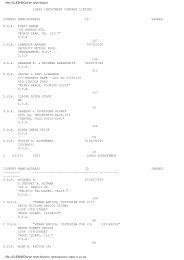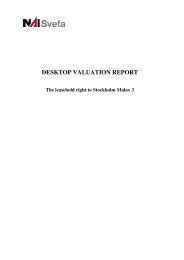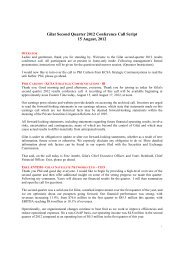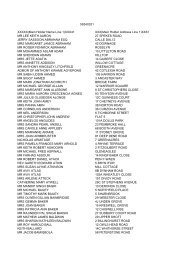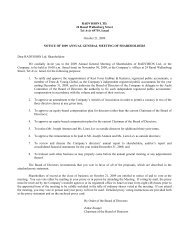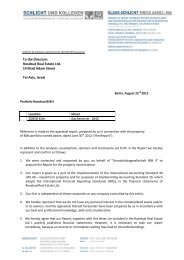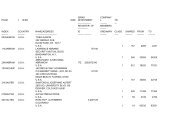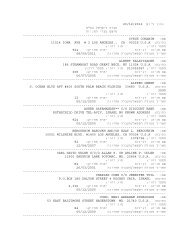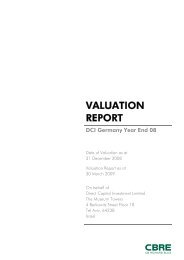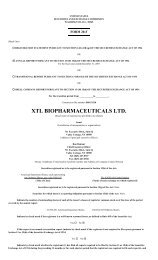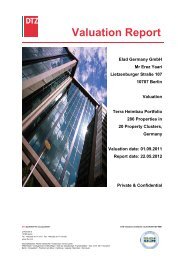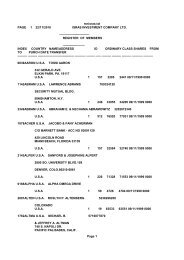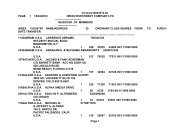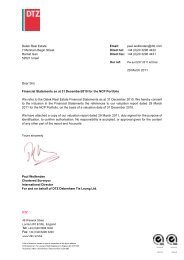RETALIX LTD.
RETALIX LTD.
RETALIX LTD.
Create successful ePaper yourself
Turn your PDF publications into a flip-book with our unique Google optimized e-Paper software.
<strong>RETALIX</strong> <strong>LTD</strong>.<br />
NOTES TO CONSOLIDATED FINANCIAL STATEMENTS (continued)<br />
NOTE 1 – SIGNIFICANT ACCOUNTING POLICIES (continued):<br />
2) In May 2005, the FASB issued Statement No. 154,’Accounting Changes and Error Corrections” (“FAS 154”), a<br />
replacement of APB No. 20, “Accounting Changes” and FASB Statement No. 3, “Reporting Accounting Changes in<br />
Interim Financial Statements”. FAS 154 provides guidance on the accounting for and reporting of accounting changes<br />
and error corrections. APB No. 20 previously required that most voluntary changes in accounting principles be<br />
recognized by including in net income for the period of the change, the cumulative effect of changing to the new<br />
accounting principle. FAS 154 requires retroactive application to prior periods’ financial statements of a voluntary<br />
change in accounting principles unless it is impracticable. FAS 154 is effective for accounting changes and corrections of<br />
errors made in fiscal years beginning after December 15, 2005. The Company does not expect that the adoption of FAS<br />
154 will have a material impact on its financial position or results of operations.<br />
3) In November 2004, the FASB issued Statement No. 151, “Inventory Costs, an Amendment of ARB No. 43, Chapter<br />
4.” (“FAS 151”). FAS 151 amends Accounting Research Bulletin (“ARB”) No. 43, Chapter 4, to clarify that abnormal<br />
amounts of idle facility expense, freight handling costs and wasted materials (spoilage) should be recognized as currentperiod<br />
charges. In addition, FAS 151 requires that allocation of fixed production overheads to the costs of conversion be<br />
based on normal capacity of the production facilities. FAS 151 is effective for inventory costs incurred during fiscal<br />
years beginning after June 15, 2005. The Company does not expect that the adoption of FAS 151 will have a material<br />
effect on its financial position or results of operations.<br />
4) In November 2005, the FASB issued FASB Staff Position (“FSP”) 115-1, “The Meaning of Other-Than-Temporary<br />
Impairment and its Application to Certain Investments”. The FSP addresses the determination as to when an investment<br />
is considered impaired, whether that impairment is other than temporary, and the measurement of an impairment loss.<br />
The FSP also includes accounting considerations subsequent to the recognition of other than-temporary impairment and<br />
requires certain disclosures about unrealized losses that have not been recognized as other-than-temporary impairments.<br />
The guidance in this FSP amends FASB Statement No. 115, “Accounting for Certain Investments in Debt and<br />
Equity” (“FAS 115”). The FSP replaces the impairment evaluation guidance of EITF Issue No. 03-1, “The Meaning of<br />
Other-Than-Temporary Impairment and Its Application to Certain Investments,” with references to the existing otherthan-temporary<br />
impairment guidance. The FSP clarifies that an investor should recognize an impairment loss no later<br />
than when the impairment is deemed other-than-temporary, even if a decision to sell an impaired security has not been<br />
made. The guidance in this FSP is to be applied to reporting periods beginning after December 15, 2005.<br />
v. Reclassification:<br />
As of December 31, 2005, adoption of FSP 115-1 will not have a material impact on the Company’s financial position or<br />
results of operations.<br />
Certain comparative figures have been reclassified to conform to the current year presentation.<br />
F-19



